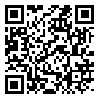Volume 3, Issue 1 (january 2019)
AOH 2019, 3(1): 276-282 |
Back to browse issues page
Download citation:
BibTeX | RIS | EndNote | Medlars | ProCite | Reference Manager | RefWorks
Send citation to:



BibTeX | RIS | EndNote | Medlars | ProCite | Reference Manager | RefWorks
Send citation to:
Naseri Karimvand M, Hasheminejad N, Faghihi Zarandi A, Jahani Y. Evaluation of Workload and Human Errors in Nurses
. AOH 2019; 3 (1) :276-282
URL: http://aoh.ssu.ac.ir/article-1-100-en.html
URL: http://aoh.ssu.ac.ir/article-1-100-en.html
1- MSc, Department of Occupational Health Engineering, Faculty of Public Health, Kerman University of Medical Sciences, Kerman, Iran , Naserikarimvand@yahoo.com
2- PhD, Department of Occupational Health, Faculty of Public Health, Kerman University of Medical Sciences, Kerman, Iran•
3- PhD, Department of Occupational Health, Faculty of Public Health, Kerman University of Medical Sciences, Kerman, Iran
4- PhD, Department of Biostatistics and Epidemiology, Faculty of Public Health, Kerman University of Medical Sciences, Kerman, Iran
2- PhD, Department of Occupational Health, Faculty of Public Health, Kerman University of Medical Sciences, Kerman, Iran•
3- PhD, Department of Occupational Health, Faculty of Public Health, Kerman University of Medical Sciences, Kerman, Iran
4- PhD, Department of Biostatistics and Epidemiology, Faculty of Public Health, Kerman University of Medical Sciences, Kerman, Iran
Abstract: (3933 Views)
Background: Identification of human errors and their related factors in nurses dealing with the health of humans is important. Considering that much workload can increase the risk of human error, this study aimed to investigate the relationship between workload and human errors among nurses working in educational hospitals of Kerman University of Medical Sciences. Methods: This descriptive-analytical study was performed on 145 nurses from educational hospitals affiliated to Kerman University of Medical Sciences in 20. The workload was evaluated using the NASA-TLX questionnaire and human errors with SHERPA technique. The statistical test used was logistic regression model and the statistical significance level was considered <0.05 and the samples were selected randomly. The sample size was selected based on the percentage of functional errors reported by a study on human error assessment related to the duties of nurses in Semnan. Results: A total of 138 probable errors were detected in the nursing staff of these hospitals, 74% of nurses committed errors in seven main duties during their service. Patient medication with the highest frequency (34%) followed by the injection of the drug to the patient with a frequency of 23% were the most frequently committed errors by nurses. The findings of the research showed that workload in 53.1% of the nurses was very high and in 43.1% of the nurses was high, the results of the logistic regression model showed that there was no significant relationship between errors and workload in nurses. Conclusion: The results of the study showed that the average workload and human error in the nurses were high. Therefore, control strategies such as holding training sessions, implementation of clinical governance program in all wards, recruitment of adequate nurses, reduction of workload, reduction of work hours and the appropriate patient/nurse ratio should be given attention by the hospital managers depending on conditions; as well as the prevention of the two reported errors should be given top priority in corrective measures
Send email to the article author
| Rights and permissions | |
 |
This work is licensed under a Creative Commons Attribution-NonCommercial 4.0 International License. |







